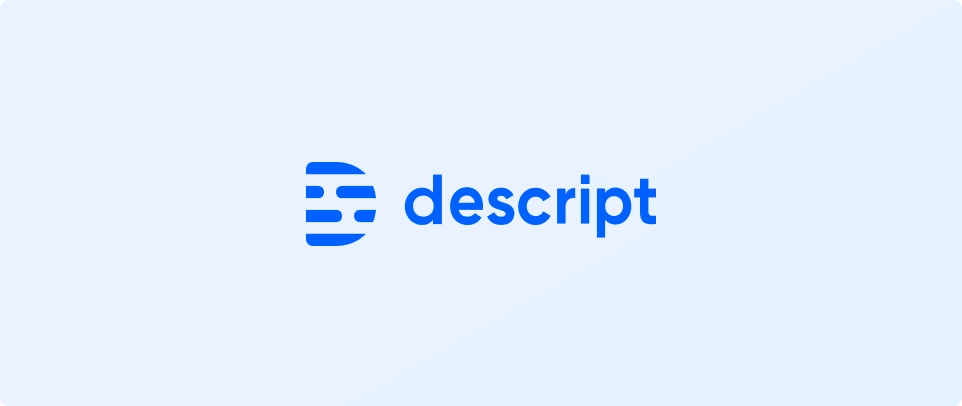In early 2019, Naval Ravikant and Babak Nivi, co-founders of AngelList, decided to take Naval’s frequent blog posts and turn them into a podcast. The Naval Podcast gets to the meat of a topic in one to four minutes, but episodes originate from much longer conversations—sometimes over an hour—between Naval and Babak.
“Each podcast is heavily edited to keep it fast-paced and interesting,” says Nivi. He takes parts of each interview and stitches them together, removing filler words and sidebars, to create the punchy podcasts. To edit the episodes down, the team behind the Naval Podcast uses Descript, a suite of tools that help new media creators record, transcribe, edit, and mix—all as easily as editing or typing a word document. Descript makes it easy for podcast creators and editors to deliver the best content.

Andrew Mason is the CEO and Founder of Descript. Before moving into the podcast space, he was the Founder and CEO of Groupon—where he came to understand the value of tools that make your work easier.
While at Groupon, Andrew learned the importance of tooling: "We neglected the importance of internal tools, and anytime there was a choice between building something that would benefit customers or something that would help employees, we chose customers," he says. So it wasn't until very late in the company's history that they built a team dedicated to internal tools.
A great marker of a CEO is finding ways to empower teams to move faster without sacrificing the end result. When he reflects on Groupon's experience, Andrew wishes they'd developed their tooling muscle earlier on.
Now, as the CEO of Descript, he spends much of his time as an individual contributor unblocking members of his team. As a result, he's often evaluating tools and streamlining operations so that everyone can work more efficiently. When weighing the decision to invest in internal tooling or work on customer-facing features, Andrew decided to find a solution that allowed both.
Andrew first realized that Descript needed a tooling solution when its admin workflows became a hassle to create. "It was a really manual process because non-technical folks weren't able to build the workflows, and engineers were strapped for time working on user-facing features," he explains. What's more, the process was fragile and could easily go wrong because they would use a command-line interface (CLI) or Paw (API tool for Mac) to access the API.
Andrew came across Retool, and within minutes of signing up, he had hooked up Descript's API and, "immediately, I was in love—it was just the tool that I'd been dreaming about."
In his time at Groupon and Descript, Andrew has been known to propose new tools and workflows to his coworkers—which was often met with rolling eyes. But his commitment to constant improvement is steadfast, and when he found Retool, he wanted to empower his team with it.
The first thing he did was hook up some basic workflows, such as sending an invitation to a user and deleting a user. Both flows were previously set up manually by engineers, but he built them himself using Retool.

For Andrew, Retool quickly unlocked a ton of potential for his team to do more. "I'm always thinking about ways to enable non-engineers to do all sorts of things without relying on engineers," he explains. With Retool, he and his team could build any kind of app they needed without requiring tons of engineering resources. This way, they could customize and use tools while staying focused on delivering value to the customer. "It wasn't a trade-off anymore," he says.
With the load lifted off engineering and workflows moving into Retool, it was soon embraced by technical and non-technical team members alike.
“Retool is one of the only tools that has been adopted as much by our engineers as it has by our business teams, which isn’t always the case with others—it’s truly universally appreciated.”
Nowadays, "Just about everyone at the company uses Retool," Andrew says. They use it for everything from looking up users to performing internal operations or data queries and running reports. In fact, every major object in their application is searchable and inspectable via Retool. They also use it to control beta testing and provide developers with a quick way to access information.
By making information accessible to everyone across the company and empowering teams to build their own tooling when they need it, Retool saves time for all teams. As a result, teams at Descript can focus on better serving customers like the Naval Podcast.
From a leadership standpoint, Andrew no longer has to weigh the option of investing engineering resources in an internal application versus something user-facing. "The power of Retool lies in how it unlocks the power of a developer for the average business user and eliminates the choice between building internal tools that make you more productive and building features that benefit your customers," he explains.
"Ultimately, using Retool benefits our customers and our team because it makes us better at what we do."
As a leader, Andrew is committed to shipping the best product for customers—which starts with the best tools for his team. Because when employees are more efficient, informed, and equipped, they're better able to deliver solutions.
With a platform like Retool, engineering, and business teams alike can focus on their craft instead of the minutiae of finding information or building (and using) hard-to-use apps. They're able to see the full picture, access data, and build the best products.
And Andrew has seen the frustration a lack of tooling can create amongst teams. In fact, a 12-question Gallup survey on employee engagement includes "Do you have the materials and equipment to do your work right?" in their 12-question engagement survey. And career site, BuiltIn, states that resources and tools are one of the 20 drivers of employee engagement.
Without internal tools, employees lack the resources to do their jobs. They risk becoming frustrated, distracted, and disengaged—which can cost a company far more than the tooling itself. Instead of focusing on the work that matters, they spend time figuring out what to do and how to do it. By investing in tools and empowering employees across the organization, people are more engaged and get to do the work they joined a company to do.
The way Andrew sees it, "It's a no-brainer for a startup to have Retool—it's an essential app and hard to imagine going back to a world where something like it didn't exist."
Reader



